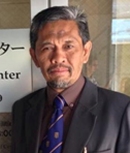
Plenary Lecture
STEM Education : Integrating Acquired & Revealed Knowledge to Improve Learning Outcome

Professor Azami Zaharim
Principle Research Fellow
Institute Islam Hadhari
&
Centre for Engineering Education Research
Faculty of Engineering & Built Environment
Universiti Kebangsaan Malaysia
MALAYSIA
E-mail: azami.zaharim@gmail.com
Abstract: Science, Technology, Engineering and Mathematics (STEM) education play a crucial role in economic development. STEM fields promising wide career opportunities, career flexibility and lucrative salaries. Many efforts of various parties including education policy leader and educators to make improvements to strengthen STEM education. For most of us, the contemporary Science, Technology, Engineering and Mathematics (STEM) education is based on purely objective knowledge which also known as acquired knowledge. However, this one sided source of knowledge, neglecting subjective knowledge, produces people with ‘Excellence without a soul’ as mentioned by Harry Lewis (2006). Steven Muller, former President of John Hopkins University, USA stated that (Ulin 1980) ‘The failure to rally around a set of values means that universities are turning out potentially highly skilled barbarians’. Buncker Roy (1992) had remarked that ‘Having literates do more harm than good’. Based on these observations, there are a need and idea to integrate objective and subjective knowledge, so that the learning outcome of STEM education will produce people with wholly rounded skills, potential and abilities, competencies, together with emotional and spiritual quotients. In Islam, subjective knowledge refers to the ‘revealed knowledge’ which is a knowledge based on believing in revelation from God as described in al-Qur’an. This paper describes an attempt to integrate STEM education with revealed knowledge which has been deployed by Muslim scholars in the mediaeval era.
Brief Biography of the Speaker: Azami Zaharim is a Professor at the Faculty of Engineering & Built Environment, Universiti Kebangsaan Malaysia, and previously served as Head of Centre for Engineering Education Research, Faculty of Engineering & Built Environment, UKM starting 2009 until 2014. He obtained his BSc with Honours in Statistics and Computing from North London University, UK in 1988. In 1996, he completed his PhD at University of Newcastle Upon Tyne, UK in the area of Statistics.
His research interest is on renewable energy, engineering education and engineering mathematics. He is currently an Associate Principal Research Fellow in Solar Energy Research Institute, a center of excellence for the research and development in solar energy technology. He also a Principle Research Fellow for Institute Islam Hadhari, UKM. Due to the activities in engineering education, he was selected as an editor in the Journal of Engineering Education by Universiti Teknologi Malaysia in the year 2005 and organizing a special session on OBE at the International Conference on Engineering Education in Greece July 2007, 2008, 2009 and elected as an editor for the WSEAS Transaction Journal of Engineering Education.
Meanwhile at the national level, he was invited by INTAN to conduct a workshop on research methodology for government scholarship holders at the post-graduate level. In addition, the Food Quality Division of the Health Ministry also invited him to lecture on the topic of optimization using surface methodology. He has until now published over 250 research papers in journals and conferences, conducted more than 20 public opinion consultancies and delivered more than 15 keynotes/invited speeches at national and international meetings on engineering education and renewable energy.